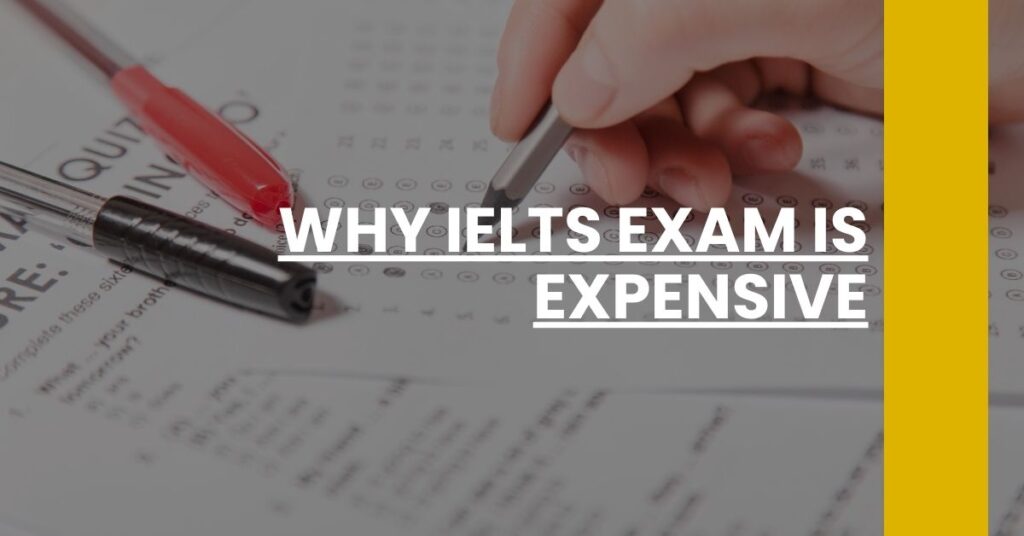The IELTS exam is a globally recognized English proficiency test often considered expensive due to its broad acceptance and the high standards it upholds. When you’re looking to understand why the IELTS exam is costly, it’s important to consider:
- The extensive development and administration behind the test.
- Quality control measures and training of examiners.
- Security protocols to maintain the integrity of the exam.
Although the IELTS test fee might seem steep, it reflects the value and prestige attached to the certification it provides, which opens doors internationally for education and career opportunities. If you’re asking “Why is the IELTS exam expensive?”, the answer lies in the investments made to ensure it remains a reliable and trusted assessment of your English language skills. Read on to find out how this investment translates into the fee and what other costs might be involved.
- Understanding IELTS and Its Global Recognition
- The Components That Make Up the IELTS Exam Fee
- Behind the Scenes: The Price of Quality and Integrity
- Administrative Costs and Logistics
- Technology and Innovation in Test Delivery
- Additional Expenses: Beyond the Basic Test Fee
- Financial Aid and Support for Test Takers
- Conclusion: Is the Price Justified?
Understanding IELTS and Its Global Recognition
When you set your sights on an opportunity that demands English proficiency—whether it’s for higher education, career advancement, or immigration—a solid score on the International English Language Testing System (IELTS) can open doors for you. IELTS is more than just an exam; it’s a key recognized worldwide, unlocking opportunities across the globe.
Designed to assess the English language skills of non-native speakers, IELTS is the standard for universities, employers, and even governments in English-speaking countries. The accuracy and reliability of the scores are paramount, creating an expectation for an impeccable standard of testing. With over four million tests taken annually, the stakes are high for both the test providers and the hopeful candidates like you seeking to prove their language proficiency.
As you consider the investment in this pivotal step, remember that the price you’re paying reflects the global prestige of the test. The meticulous design and broad acceptance underscore its validity and reliability. You’re not just paying for the test itself; you’re investing in an internationally recognized benchmark that could significantly change your personal and professional trajectory. For a closer look at why IELTS is so highly esteemed, you might want to peruse the official IELTS website.
The Components That Make Up the IELTS Exam Fee
Now, let’s unpack the reasons why undergoing the IELTS test goes beyond the realm of just an average test fee. At first glance, the expense might seem steep, but when you peel back the layers, you’ll see a complex mix of components that contribute to the cost.
- Test Development: Crafting an IELTS test is an intricate process. It involves language experts and psychologists to ensure that the test is unbiased and accurately measures your true English proficiency.
- Administration: From the moment you register to the time you receive your results, there are numerous administrative tasks being performed. The staff’s professionalism and efficiency are key in this logistics-heavy operation.
- Security: IELTS maintains strict security to protect the integrity of your results. This includes measures to prevent any form of cheating and fraud.
By recognizing these sophisticated features, you’re getting a sense of the complex machinery working behind the scenes to make the test fair, accurate, and reliable. It’s not just an exam; it’s a testament to your capabilities that can stand up to international scrutiny. For a comprehensive understanding of the test types and what you’re paying for, you can delve into the detailed breakdown on the IELTS test types page.
Behind the Scenes: The Price of Quality and Integrity
Imagine the challenge of creating a test that evaluates the nuanced skills of speaking, writing, reading, and listening in English. It doesn’t stop with the test creation; the process of maintaining the quality and integrity of the IELTS is continuous and demanding.
- High-Quality Materials: Each version of the test is developed through rigorous research. It must be predictive, reflective of real-world language use, and immune to bias or cultural slants.
- Training of Examiners: Your speaking and writing skills are evaluated by qualified examiners, whose ongoing training ensures they grade your performance accurately and consistently.
- Security Measures: The test’s reputation is upheld through stringent security procedures, like biometric verification, which may feel like an airport security check. These measures prevent imposters and ensure everyone is on a level playing field.
Each of these aspects incurs costs that are non-negotiable. They are foundational to the value that an IELTS score holds. By taking this test, you’re not just proving your language skills; you’re placing yourself within a framework trusted by leading institutions worldwide. For an insight into the test day experience and the lengths that IELTS goes to maintain security and quality, consider reading through this WES advisor blog post. It offers an excellent overview of what you can expect and why these measures are in place.
Administrative Costs and Logistics
Let’s delve into the often-overlooked realm of administrative logistics, which plays a pivotal role in why the IELTS exam is expensive. Behind every test is an infrastructure that seamlessly administers and oversees the detailed process, ensuring an experience that meets international standards.
Facility Management: Test centers around the world require upkeep. They’re fitted with specialized audio equipment for listening tests and provide a comfortable environment conducive to performance. These centers aren’t just rooms with desks; they’re carefully controlled environments where every detail, from lighting to seating, is planned to optimize your test-taking experience.
Staffing: Examiners and administrative personnel are not only pivotal but must also be paid a fair wage. These are professionals dedicated to maintaining the high standard of IELTS, and their expertise is reflected in your test fee.
Customer Service: Support doesn’t just end once you’ve completed your test. Post-exam services, including answering your queries and providing additional information, require a robust customer service team. This level of support is factored into the operational costs.
For a detailed look at what it takes to run an IELTS test center and the associated costs, consider exploring the IELTS test types page. Here, you’ll find insights into the logistical dance that ensures you have a smooth test day.
Technology and Innovation in Test Delivery
In an era that thrives on technological advancements, IELTS has embraced innovation to remain at the forefront of language testing. With the introduction of computer-based testing options, the landscape has changed. This transition to digital presents both opportunities and additional expenses:
Software Development: Keeping the test secure and user-friendly requires sophisticated software, which is continuously updated.
Hardware Investments: Computer labs need high-performance equipment that can handle the testing software while providing a reliable and uniform test-taking experience for each candidate.
While these technological enhancements may contribute to the cost, they also offer advantages like faster results and more test dates. Embracing the digital version could benefit your testing experience in multiple ways. Though specific research regarding the impact of these factors hasn’t been provided, it’s clear that technology plays a significant role in shaping the IELTS.
Additional Expenses: Beyond the Basic Test Fee
As you prepare for your IELTS journey, it’s crucial to consider potential additional expenses that may influence your budget. These could include:
- Cancellation and Rescheduling Fees: Sometimes life doesn’t go as planned. If you need to cancel or change your test date, you’ll encounter additional fees.
- Additional Test Report Forms (TRFs): Though your test fee includes the issue of a handful of TRFs, should you need more, there will be charges per additional report.
- Enquiry on Results (EOR): If you believe that your test result doesn’t accurately reflect your abilities, you can apply for a re-evaluation. This service, known as Enquiry on Results, comes with a fee.
All these factors add layers to the overall cost of your IELTS experience. Being aware of these potential extra charges helps in planning and managing your finances more effectively. For a clearer breakdown of these fees and additional services, visit Magoosh’s explanation on IELTS fees, which will provide a comprehensive overview of the costs you might incur.
Financial Aid and Support for Test Takers
Understanding the intricacies behind why the IELTS exam is expensive might have you wondering if there are avenues of financial support to alleviate the burden of the cost. While the IELTS organization itself does not typically offer financial aid directly, there could be scholarships or sponsorships available through educational institutions or local organizations in your country.
Moreover, it might be worth your while to explore study-abroad programs or educational foundations that offer to fund part of the exam fee for qualifying individuals. While no specific research data has been provided on financial assistance for IELTS test takers, a proactive approach in seeking out opportunities can be beneficial. Networking with educational advisors or scouring forums dedicated to IELTS preparation may uncover useful leads.
Conclusion: Is the Price Justified?
As we reach the culmination of our exploration into why the IELTS exam is expensive, we’re confronted with a crucial question: Is the price justified? To judge this, reflect on the layers of meticulous development, logistical finesse, and technological innovation that converge to produce a test of unparalleled recognition.
By demystifying the factors contributing to the cost, you should now feel more informed about what exactly your fee is financing. While the initial sticker shock is understandable, recognizing the significant investment IELTS makes to ensure the highest standards can help reconcile the cost with the value it offers in your personal and professional life.
Ultimately, preparing for and taking the IELTS exam is not just an expenditure—it’s an investment in your future. It’s a gateway to opportunities that might otherwise be inaccessible. The price tag can be steep, but so can be the returns on that investment as you unlock new chapters in your international journey. Whether the expense is justified is a personal evaluation, but one thing is clear: IELTS holds a key to the world that many believe is well worth the cost.
Why IELTS exam is expensive: Uncover costs of test development, security, and global recognition in our comprehensive analysis.

